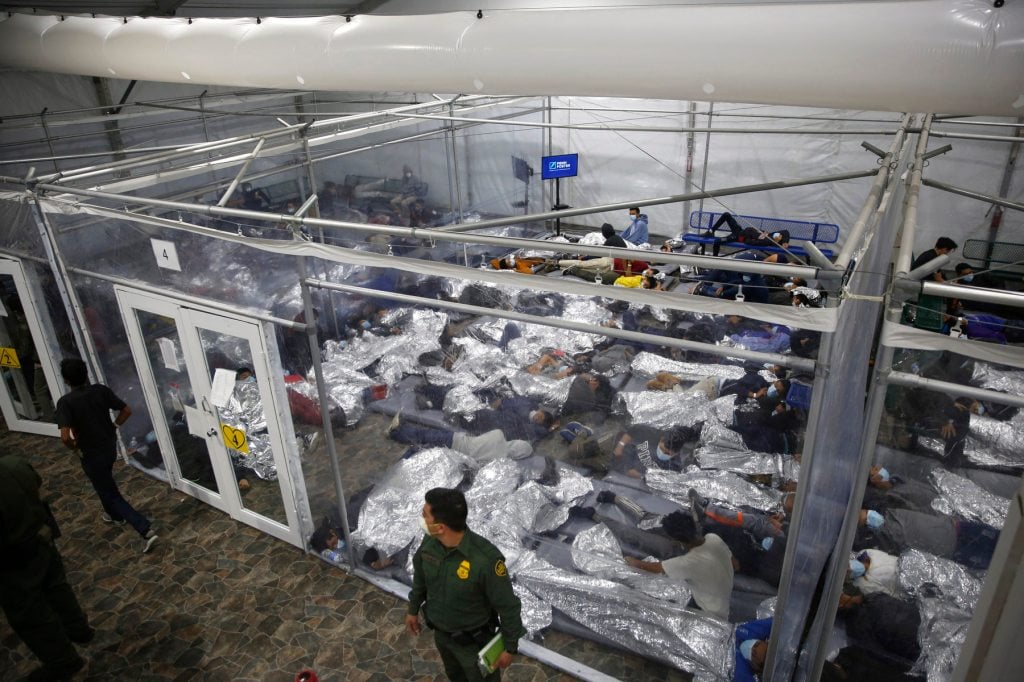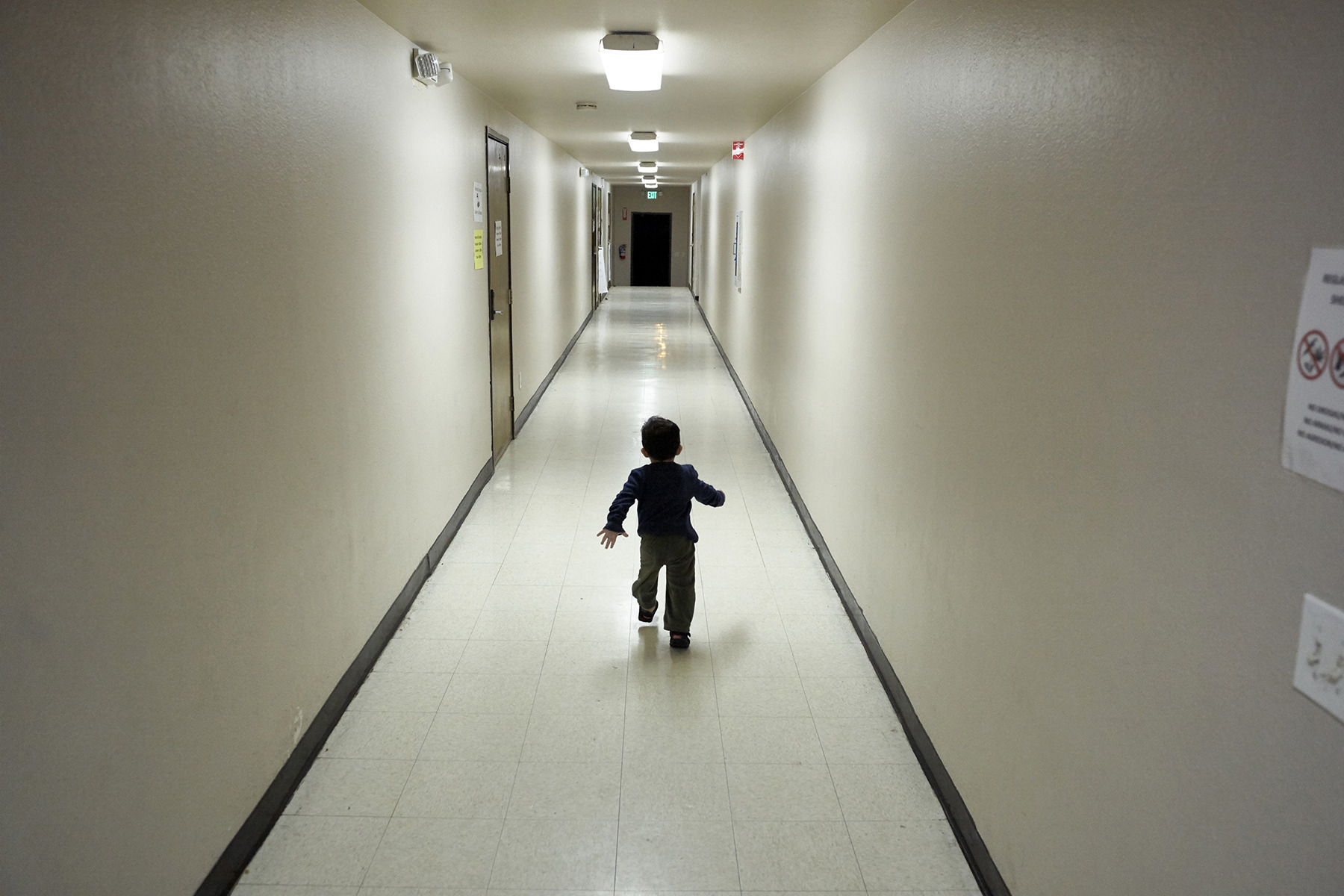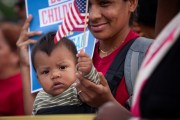Editor’s note: This article has been updated to clarify the scope of the Young Center for Immigrant Children's Rights' work.
President Donald Trump’s so-called “one, big beautiful” tax and spending bill allocates $170 billion to fulfill the administration’s long list of immigration priorities, including hiring for law enforcement agents, border security personnel and immigration court judges.
Also tucked into the massive, nearly 1,000-page legislation are provisions that pave the way for migrant children to face longer periods in detention with fewer legal protections.
The bill designates $45 billion to build new immigration and family detention facilities. One analysis by the American Immigration Council found that this funding would amount to at least 116,000 additional detention beds. The legislation also states that families, including their children, may be detained indefinitely until courts reach a decision in their case.
Advocates for migrant children told The 19th this is the latest in a series of recent efforts by Republicans that chip away at the quality of care for migrant children in the government’s custody.
For years, Trump and his associates have had their eyes on ending the Flores Settlement, a decades-long court agreement meant to legally bind the federal government to certain safety and well-being standards for children held in detention. Up until now, those efforts have been struck down by federal courts.
In Trump’s second term, the administration is continuing to target these legal safeguards — and in some cases allegedly violating the parameters of the Flores Settlement, advocates said.
-
Read Next:
“Our constitution says no cruel and unusual punishment, and other federal laws and values also state you have to treat them with a fair modicum of respect and provide for their basic needs,” said Sergio Perez, executive director of the Center for Human Rights and Constitutional Law, one of three legal organizations known as the “Flores Counsel” tasked with enforcing the settlement.
“That’s all we’ve been asking for through the initial Flores litigation, and the enforcement of the settlement agreement: that these vulnerable populations, children and families, be given the necessities to survive while they are being detained by the federal government.”
The Flores Settlement outlines the oversight and standard of care for both accompanied and unaccompanied migrant children. Prior to the settlement, kids slept in rooms with adult strangers, were subjected to arbitrary strip searches and had no rights to visitation, education or recreational activities.
The resulting lawsuit led to a negotiated agreement generally requiring federal agencies to house detained minors in facilities licensed for children’s care, provide the detained children with access to health care and education, and make efforts to release detained minors to family members or other qualified custodians “without unnecessary delay.” These requirements apply to both accompanied and unaccompanied minors.
Generally, migrant youth who are unaccompanied by a parent or legal guardian enter the care of the Office of Refugee Resettlement under the Department of Health and Human Services. They are then placed in shelters before ultimately released to a guardian or sponsor. Minors who are arrested by Immigration and Customs Enforcement (ICE) with their families often stay in family detention centers managed by the immigration enforcement officials under the Department of Homeland Security.
While the core provisions of the Flores agreement have remained since 1997, it has faced unsuccessful challenges from over the past decade: President Barack Obama’s administrations sought to exclude accompanied minors from the protections, and in 2019 the Trump administration tried to replace the agreement with new regulations.
The Flores Counsel primarily push for enforcement through the courts. The essential function of the Flores agreement, experts said, is a set of standards they can use to hold the executive branch accountable when violations occur. It allows attorneys from three legal organizations to monitor immigration facilities throughout the country and speak with children about their experiences: the National Center for Youth Law, Children’s Rights and the Center for Human Rights and Constitutional Law.
The Office of Refugee Resettlement runs “240 shelters and across 27 states” that house unaccompanied migrant children, according to the office’s website. Among the facilities managed by ICE, the South Texas Family Residential Center and the Karnes County Detention Facility currently hold families.
“Across multiple administrations, our team has gathered overwhelming evidence of the government’s persistent failure to meet the Flores Settlement’s basic standards, returned to court to hold the government accountable, and secured repeated court rulings confirming that the government is in fact violating the terms of its own agreement,” said Melissa Adamson, a senior attorney for the National Center for Youth Law.

Despite decades of court decisions reaffirming a continuing need for the Flores protections, advocates charged with enforcing the agreement are facing a barrage of tests in the new Trump administration that has real-time consequences for children and their families, Perez said.
New rules governing the Office of Refugee Resettlement under the Department of Health and Human Services have extended waiting times for children in shelters. One policy added more restrictions on who can “sponsor” a child, or take temporary custody of a child in the care of the Office of Refugee Resettlement. The administration said it seeks to ensure the safety of migrant children. Advocates say the measure disqualifies parents, siblings and other close family members from sponsoring unaccompanied minors.
In March, the Department of Homeland Security closed three offices focused on civil rights and oversight of immigration policies and detention facilities.
In May, the Department of Justice filed a motion in court seeking to end the Flores agreement in its entirety, arguing that immigration decisions should be left to the executive branch rather than the judiciary branch. It also stated that the Flores requirement for migrant children to be held in state-licensed child care facilities is an “impossible task” for children detained with their loved ones in family detention centers.
Immigration enforcement agents have also carried out unannounced “wellness checks” at schools and homes that have resulted in the detention of children and their family members. Earlier this month, nearly 100 National Guard members and federal officers raided MacArthur Park in Los Angeles, disrupting a children’s summer camp.
“What we’re seeing here in Los Angeles are processing centers that are meant to hold individuals for a couple of hours, at most, now being used to house individuals for several nights,” Perez said. “What Trump is doing — the tenor of it, the scale of it and the rhetoric of it — completely stands on its own.”
One court motion filed in June by the National Center for Youth Law, Children’s Rights and the Center for Human Rights and Constitutional Law, presents evidence of the Trump administration allegedly violating the Flores agreement and includes declarations from more than 20 individuals about the conditions inside detention facilities.
“My children have a disability, Marfan Syndrome, which causes mental and cognitive challenges,” stated one mother. “They cry and worry. It is very difficult for them to handle being here. They are afraid and don’t know how long we will be forced to stay here.”
A 16-year-old taken by ICE with his mother and two younger siblings testified that “for water to drink, there is a very dirty water container with a strong chemical smell. They told us this was the water we had to drink.”
The new budget reconciliation bill may only add fuel to the fire because “they now have billions of dollars to detain, deport and separate,” said Mary Miller Flowers, the director of policy and legislative affairs for the Young Center for Immigrant Children’s Rights, an organization that ensures unaccompanied children have legal representation.
For now, continued litigation against the Trump administration will be key, Miller Flowers said. The Young Center is building up its litigation team and pushing for Congress to do more oversight, she added.
“I think we really have to keep changing the narrative on immigrant families, communities and children,” Miller Flowers said. She wants to empower the public to “not be OK with the pain and suffering that we’re enacting on families, and really push their members of Congress to make different decisions to challenge these rules.”
Several advocates told The 19th they view the measure as one way to override the Flores Settlement restrictions on the length of time children can be detained. Research indicates that any amount of detention can negatively impact a child’s mental health, and these harms are exacerbated during long periods in detention.
This June, Adamson met with a mother, father and their young daughter being held at a family detention center in Dilley, Texas. In that conversation it became clear how the girl was processing the ICE staff’s treatment of her family.
“The little girl was coloring while I spoke with her parents, and it was at one point in the interview when she turned to me — with no warning, really out of the blue — and said, ‘There are monsters here,’” Adamson said. “I asked her, ‘What do you mean?’ And she said, ‘There are monsters outside, and they’re everywhere.’”
Feeling overwhelmed by the news? The 19th is considering new ways to keep you informed. But we need your input. Fill out this quick survey to share your thoughts.







